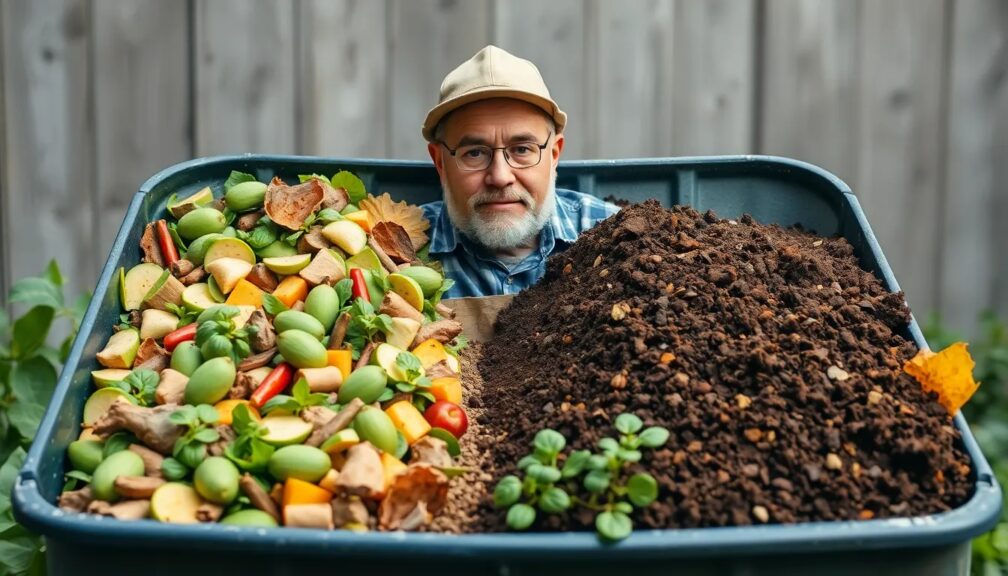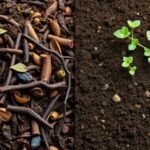What happens if you don't mix your compost

Composting is a fantastic way to recycle organic waste, turning kitchen scraps and yard trimmings into nutrient-rich soil amendment for gardening. However, the process is not as simple as just piling up organic material and waiting for it to transform. One critical step in composting is the mixing or turning of the compost pile. But what happens if you neglect this step? In this article, we'll delve into the consequences of not mixing your compost, from the impact on decomposition rates to potential problems with odor, pests, and overall compost quality. Understanding the importance of this practice can help ensure that your composting efforts are both effective and environmentally friendly.
What happens if you don't mix compost?
Imagine peering into your garden, expecting a scene of lush growth and blooming flowers, only to be greeted by mediocre plant performance. This could be the reality if you overlook one critical step in compost management—mixing.
Neglecting to mix compost is a gamble that can lead to a series of unfortunate events in your garden. The art of composting is more than just piling up kitchen scraps and yard waste. It's a delicate balance, a dance of decomposition that requires your regular participation.
Without mixing, compost piles can become anaerobic, a state where oxygen is scarce. Picture the center of your compost, dense and compacted, slowly turning into a smelly, sludgy mess. The lack of oxygen can cause a proliferation of harmful bacteria, leading to a compost that is not only unpleasant but potentially hazardous to your plants.
Moreover, the absence of mixing can result in an uneven breakdown of materials. Some parts of the pile may decompose well, while others remain stubbornly intact, creating a patchwork of readiness in your compost. When you finally spread this inconsistent mix into your garden, some plants will feast, while others will falter, causing an imbalanced ecosystem right in your backyard.
However, the risks of not mixing compost extend beyond just the health of your plants. The magic of a well-tended compost lies in its ability to improve soil structure, promote beneficial microbial activity, and even help in carbon sequestration. Ignoring the mixing process can mean missing out on these vital benefits, and who wants to be responsible for that, especially when every gardener dreams of contributing positively to the environment?
But wait, there's more. Have you ever considered the attraction your compost pile might have for unwanted pests? Without regular mixing, your compost could become a haven for rodents and insects, leading to a potential infestation that no one desires.
Don't let your compost dreams turn into nightmares. The simple act of turning your compost regularly can be the dividing line between a flourishing garden and a faltering one. Make sure to stay tuned for more insights on how to achieve composting success and ensure that your garden remains the envy of all who behold it.
What happens if I don't stir my compost?
Unveiling the mysteries of composting, one might ponder the consequences of neglecting the simple act of stirring their pile. Imagine the treasure trove of nutrients that could be locked away, the unseen microbial action that could be stifled, and the potential for a luscious garden that might never materialize.
Consider the heart of your compost: a vibrant ecosystem teeming with life. Without the occasional turn, this micro-world suffocates, disrupting the delicate balance needed to transform waste into gold. Not stirring your compost could mean missing out on:
1. Accelerated decomposition: Aeration is key here. Without it, your compost could take eons longer to break down.
2. Heat distribution: The natural heating process that kills pathogens and seeds needs a helping hand—or should we say, a stirring stick?
3. Moisture control: Too wet or too dry, and the compost can become a desolate wasteland for microbes. Stirring ensures a perfect habitat.
4. Odor management: That earthy scent could turn foul if waste isn't adequately mixed. Imagine the neighbors' noses upturned in disdain.
Leaving a compost pile unattended is like abandoning a living, breathing entity. The magic within requires a gentle yet firm touch to unleash its full potential. Without your intervention, the compost could become a homestead for pests, an anaerobic sludge, or a mere shadow of what it could offer your garden.
The secret to unlocking the full bounty of your compost lies in the simple act of stirring. Dare you risk losing out on the fruits of neglect? Let's ensure your garden thrives with the wealth that proper compost care can provide.
Do you need to mix your compost?
If you're on the edge of your seat wondering whether the secret to unlocking the full potential of your compost lies in the simple act of mixing, you're not alone. Countless gardeners and eco-enthusiasts are turning their attention to this crucial aspect of composting that might just be the game-changer your garden has been waiting for.
The answer is a resounding yes, but the reasons why will leave you itching to grab a pitchfork and get to work. When you mix your compost, you're doing more than just giving it a good stir; you're invigorating your pile with the oxygen it desperately needs to fuel the microscopic party happening inside.
Here's the scoop: without proper aeration, your compost can become a smelly, anaerobic disaster. But with the right technique, you can transform your pile into a nutrient-rich, soil-amending superhero. The magic lies in the balance of greens and browns, the moisture level, and yes, mixing.
Imagine the lush, vibrant plants you can grow with compost that's been mixed to perfection. It's not just about avoiding a bad smell or a failed pile; it's about the promise of a garden that thrives beyond your wildest dreams. Every turn of the compost is a step toward an eco-friendly utopia right in your backyard.
But the true power of mixing your compost is something you need to experience to believe. Stay tuned to uncover the techniques, the timing, and the tell-tale signs that your compost is ready for its next big stir. Your plants will thank you, and so will the planet.
What happens if you compost wrong?
Imagine nurturing a compost pile with the best of intentions, only to find that your efforts have gone awry. Missteps in composting can lead to a myriad of unexpected consequences, ranging from minor nuisances to significant environmental setbacks.
Firstly, an imbalance in the compost's green and brown materials can create an offensive odor that permeates your backyard, turning your eco-friendly endeavor into a smelly fiasco. But that's just the tip of the iceberg. What if I told you that incorrect composting could attract a host of unwanted pests, from rodents to insects, all flocking to your compost pile in search of a feast?
Moreover, failing to maintain proper moisture levels or to turn the pile regularly can result in a stagnant, anaerobic process, slowing down decomposition and preventing your compost from reaching its full potential. Imagine the disappointment of uncovering a wet, clumpy mess instead of the rich, fertile soil you anticipated.
Worse still, adding the wrong materials can introduce harmful pathogens and chemicals into your garden. The effects can be devastating, from killing beneficial microbes to contaminating your homegrown fruits and vegetables with substances unfit for consumption.
Now, consider the broader impact. A poorly managed compost pile can release methane, a potent greenhouse gas, directly into the atmosphere, inadvertently contributing to climate change. It's clear that the stakes are high, and the art of composting, while deeply rewarding, requires a careful, informed approach.
The good news? You're about to unlock the secrets to successful composting. By understanding and avoiding these pitfalls, you can ensure your compost thrives, transforming your organic waste into garden gold. Stay tuned to discover how to master the composting process and contribute positively to both your garden and the planet.
How do you mix compost into soil for a vegetable garden
Imagine unlocking the secret to a flourishing vegetable garden, one that envies all green thumbs in the neighborhood. The key ingredient? Composted gold – a rich, organic material that your garden is craving. Incorporating compost into your garden's soil isn't just a routine task; it's an art that can yield an abundance of fresh, healthy vegetables.
First, you need to know when the magical moment has arrived. The best time to mix compost into your garden soil is before planting, either in early spring or fall. This is when your soil is most receptive, and your future plants are yearning for nutrients.
Now, let's talk about the mixing technique. It's not simply tossing compost onto your garden beds and hoping for the best. Instead, follow these tantalizing steps for the best results:
1. Test your soil to understand its current condition – this knowledge will make your efforts even more effective.
2. Remove any weeds or debris, setting the stage for a clean integration.
3. Spread a generous layer of compost, about 2-4 inches thick, across the top of your garden bed.
4. With a garden fork or tiller, gently turn the soil, blending the compost into the top 6-8 inches of your garden bed. This step is crucial as it ensures the compost reaches the root level of your plants.
5. Water the area lightly if the compost or soil is dry, to help with the marrying process of soil and compost.
The anticipation is palpable; you can almost taste the difference in your vegetables when you give them the royal treatment with compost. But wait, there's more to this story – a tease of information that could revolutionize your gardening practice.
Stay tuned to uncover how to perfect the ratio of compost to soil, ensuring your vegetables get precisely what they need. We'll also dive into the wonders of compost tea, a liquid gold elixir that can supercharge your garden's productivity.
The allure of a bountiful harvest is just a read away. Your vegetable garden will thank you, and your palate will celebrate the difference. Don't miss out on the chance to elevate your gardening game. The journey to a more vibrant and productive garden is within reach – and it all starts with the transformative power of compost.
Consejo final: To ensure a successful composting process, regular mixing is crucial. Without mixing, your compost might take longer to decompose, could develop unpleasant odors, and may not heat up sufficiently to break down materials effectively. For a healthy compost pile, turn it every few weeks to aerate it and promote uniform decomposition. Wishing you the best in your composting endeavors!
You may be interested in these other articles: Is it OK to mix potting soil with topsoil
Is it OK to mix potting soil with topsoil What's better compost or topsoil
What's better compost or topsoil Can you plant immediately after tilling
Can you plant immediately after tilling Does tilling cause more weeds
Does tilling cause more weeds Do I need to remove weeds before tilling
Do I need to remove weeds before tillingIf you want to know more about similar articles like What happens if you don't mix your compost you can visit category Gardening Tools.